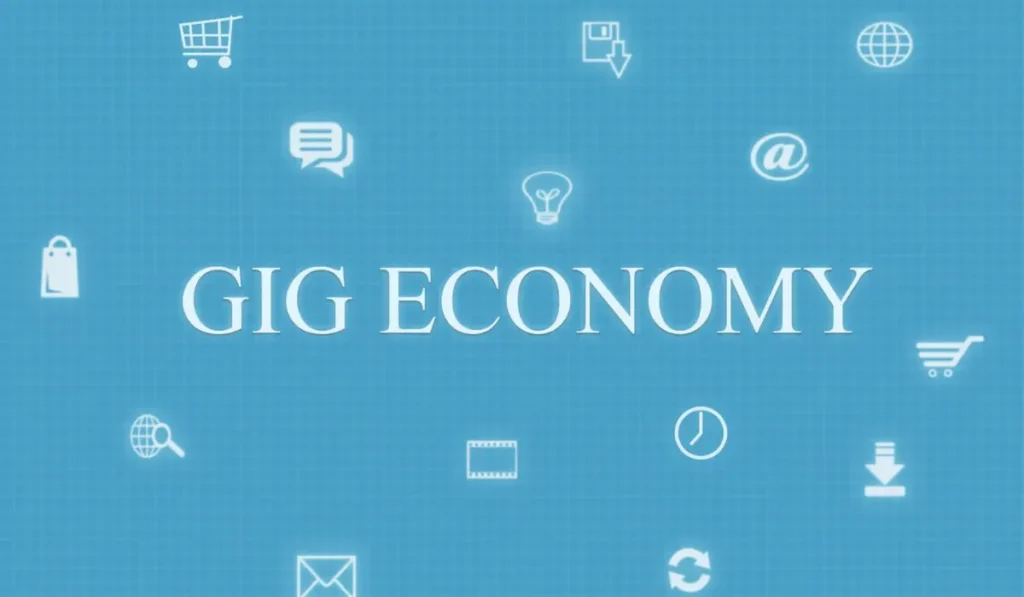‘Gig’ basically means freelance or contract work. The period of these jobs varies from 5 minutes to a year-long contract. People conceived freelance as a method to earn a few extra bucks along with the salary they earn monthly.
But now, people can solely depend on freelancing to earn a living. The gig economy makes use of people with various skills to get a one-off job done. Today, we will discuss the gig economy, the types of gig workers, and its advantages and disadvantages.
What Is A Gig Economy?
In a gig economy, companies hire freelancers and contractual workers to do the jobs. This economy only offers temporary job solutions for skilled professionals. The gig economy has become more popular over the years, mainly after the pandemic.
People only need to have a specific skill, an internet connection, and a laptop or a smartphone to do online gig work. According to surveys conducted by the World Bank, there are 435 million online gig workers in the world earning solely through freelancing. This accounts for 12.5% of the world’s total workforce.
Earlier, people used to do freelancing as a source of secondary income. However, due to the high demand for workforce, people can solely depend on freelancing as a source of primary income.
Since the labor charges are different in different parts of the world, employers can hire a cheaper workforce from any part of the world. This makes the process of providing services cheaper and more efficient.

Types Of Gig Workers
There are various types of gig workers and hence a wide variety of gig workers. The gig workers are mainly differentiated based on the skills they have to offer and the way they are employed by the employer. Take a look at the various types of gig workers:
- Freelancers: Freelancers are hired by companies based on their skills to do a job within a specific time. A contract is made between the freelancer and the company regarding the payment before the work. The freelancer can decide the payment based on the work and his/her skills. The freelance worker gets paid once the work is completed. Content writing, copywriting, graphic designing, video editing, photography, videography, video editing, etc are examples of freelance workers.
- Contractual Workers: Contractual workers are gig workers who work according to a contract set by the company. The company assigns a budget for the work and the worker has to work within this budget. They are employed for a specific period within which he/she needs to complete the job.
- Platform Workers: Gig workers who work on certain online platforms where they can be hired by an employer for a specific job. People use gig platforms like Fiverr, Upwork, Uber, Lyft, etc. to do the gig work. People can work on several platforms increasing their chances of employment. The works usually done through platforms are small gig jobs.
- Temporary Worker: Temporary workers work in a company just like a regular worker but do not get any other benefits other than the monthly salary. The period for temporary workers spans from a few months to a year. They are employed for a specific period, after which they are released. Seasonal workers who work on holidays are an example of temporary workers.
- Side Gig: People who earn a secondary income in addition to their primary income are said to be doing a side gig. Side gig workers work after their regular 9-5 jobs or during the holidays. Many companies hire people to do side gig jobs during the night. While side gigs do not pay on the level of freelance, it is a good way to make a few extra bucks.
Advantages Of The Gig Economy
- Cost Effective: The gig economy reduces the operating costs and other expenses of the companies. They do not have to offer employee benefits, paid sick leaves, and other incentives to freelancers. Companies that solely depend on freelance workers do not have to maintain huge offices and workspaces.
- Flexibility: Gig workers can work at any time according to their preferences. They do not have to work from 9 to 5 like regular workers. Freelancers are usually given a specific time to complete a job, but how they do and from where they do the job is completely under their discretion.
- Wide Job Selection: Gig workers with general skills can work on a wide variety of projects and collaborate with various teams. As a gig worker, you get to choose what project you would like to be a part of. Instead of doing monotonous jobs, you can try out different projects and be more creative.
Disadvantages Of The Gig Economy
- No Job Security: Gig workers need to be constantly on the lookout for new projects before they can finish the current one. Being employed for a specific period, you can be unemployed till the next project. This can cause anxiety and stress in a lot of gig workers. If there is less demand for the workforce, you will have to be unemployed for a longer time with no income.
- No Benefits: Companies see freelancers as a cost-effective and efficient workforce. However, gig workers do not receive any benefits like insurance, pension schemes, allowances, and incentives. The company does not have any liability to you once the contract is over.
- Burnout: Freelancers have to make hay while the sun shines. There is no job security and assurance that they will be employed once the project they work on is over. So, they have to work overtime to compensate for the time when they are unemployed. Gig workers working round the clock may lead to faster mental burnout.
Conclusion
There are several advantages and disadvantages to working as a gig worker. However, gig workers are needed for huge and small companies to survive. While it does not offer job security, it has opened a door of opportunity for people who are unable to do regular work. Accessibility to the Internet and the low cost of owning a laptop or a smartphone have helped students, housewives, and people with medical conditions to earn a living. Gig workers certainly have an impact on the overall economy.
